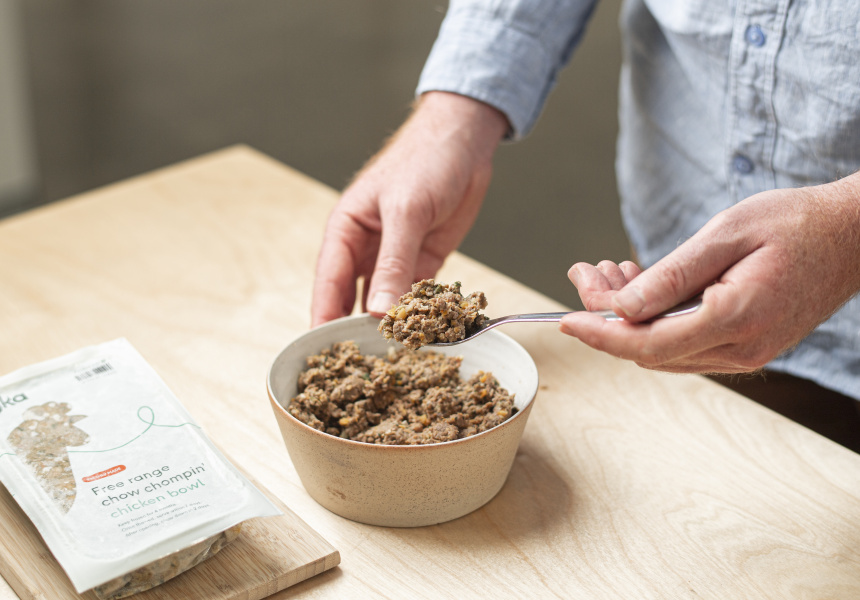- April 14, 2022
- No Comment
- 5 minutes read
Tips on Feeding Your Dog a Wholefood Diet – Broadsheet

Lyka Foudner Anna Podolsky & Dr Matt Muir
You might have friends who are on a mostly wholefood diet. But you also might have friends who have their dogs on a wholefood diet. It’s okay if you’re feeling a little confused.
“It follows the human wellness trend,” says the integrative vet and co-founder of Lyka Pet Food, Dr. Matt Muir. “We’ve kind of reverted back with human nutrition, eating a colourful, varied, well-balanced diet that’s rich in healthy vitamins and minerals and other nutrients, especially those that support healthy gut microbiomes.”
Dr Matt Muir says that he can always tell the difference between animals that are fed healthy foods and those fed a highly processed diet. It’s because of this that the vet advocates for what he calls a wholefood diet for pets – like the homemade, customisable and home-delivered pet food that a Lyka subscription offers. It’s an extension of the healthy-eating philosophy for humans that rails against processed foods, opting instead for natural, nutritionally dense ingredients.
The pitfalls of processed pet food
The biggest impediment to a dog’s health is convenience, says Dr. Muir. Processed pet food, as opposed to wholefood, is made with shelf life in mind rather than nutrition. “When we say processed diets, we’re actually saying highly heat-processed diets, cooked to high temperatures, often multiple times,” he says. “Through the ultra-processing of traditional pet foods, you lose a lot of the natural vitamins and minerals in the food and then they need to be added back in, often in synthetic form.”
What’s missing in processed foods is Dr Muir’s greatest concern. “Where the pet food industry has gone is very much away from a dog’s biologically appropriate diet,” he says. The trend towards wholefood diets is looking to provide dogs with those important – and missing – nutritional components like fresh omega-3, vitamin E, and amino acids.
“The science is coming out saying when you add these things, you can prevent disease and better manage disease processes,” Dr Muir says. “So we’re in a situation where we think that there’s a lot of antioxidants, polyphenols, amino acids and other nutrients from superfoods that dogs may need that they would get from eating wholefood that they’re not getting from the highly processed food.”
Health improvements and making the switch
There are plenty of tangible benefits to switching your dog’s processed meal to a whole food equivalent, according to Dr Muir. The increased ratio of nutrients to calories is a great way to keep weight in check, while avoiding carbs (particularly those with high glycemic index [GI]) keeps energy levels steady. “We find that dogs on a lower glycemic load diet that’s lower in carbs, higher in protein and high in healthy fats, have more sustained energy and less mood swings,” Dr Muir says.
When it comes time to ditch the kibble, Dr Muir has a few suggestions. The first is that you should be looking for something that’s nutritionally appropriate, and ideally with reputable backing. “You’re looking for foods that are complete and balanced to meet the life stage of your pet, and that can be all life stages with wholefood,” says Dr. Muir. “It should be approved by a Board-Certified veterinary nutritionist, so veterinarians who have specialised further in nutrition.”
Shopping locally, too, can make a nutritional difference. “Looking at where the ingredients are sourced from is great. We normally find that if you choose food that’s more local to you, the chances are it’s going to be more nutrient-dense,” says Dr. Muir. “Looking at ingredients, where they’re coming from, the ingredient quality itself, looking for something that is higher in protein, lower in carbohydrates, whether you can pronounce the ingredients and whether you’d eat them yourself.”
When reviewing ingredients, seek out products with fewer simple carbs and by-products. “Avoid high glycemic index foods like white potatoes and pasta and other cereals that bulk up the food, increase inflammation-causing omega 6 and are not required by dogs,” says Dr Muir. “But, I don’t think we need to steer clear of all types of carbohydrates; for example, at Lyka we use high quality carbohydrate sources in small levels like quinoa and purple sweet potato because they bring added benefits like B vitamins and the purple antioxidants.”
Overall, Dr Muir points to a holistic improvement in dogs’ health when they’re on a wholefood diet. “We see improved digestion, mood, skin and coat health, improved breath and improved dental hygiene,” he says. And while it’s important to focus on health outcomes, not every improvement is strictly clinical. “Generally, dogs on whole food get compliments at the park.”
This article is produced by Broadsheet in partnership with Lyka. Use the code BROADSHEET25 for a 25 per cent discount on your first Lyka Pet Food box. Offer expires April 24 2022. Valid for new customers only.
14 Apr 2022
14 Apr 2022
13 Apr 2022
12 Apr 2022

